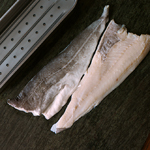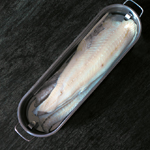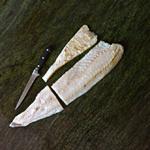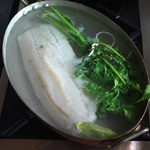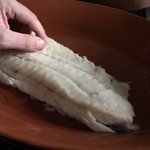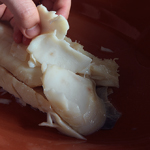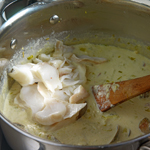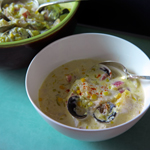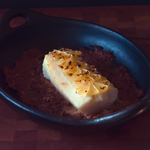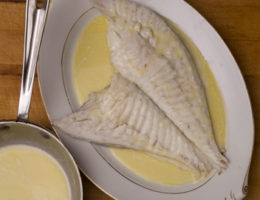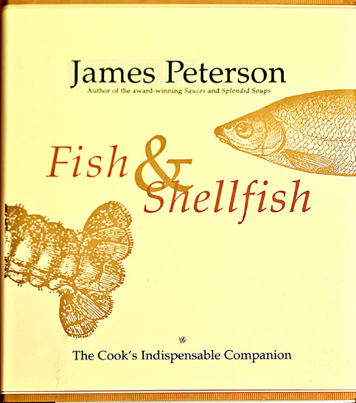Don’t confuse salt cod (bacalao) with stockfish. Stockfish is air-dried and requires a longer soaking period.Salt cod comes in many different qualities, by far the best shown here. Often, it is yellow (a sign of progressing rancidity) or excessively dry and thin. Look for the thickest filets you can find and those that resemble the unsalted fish as much as possible. Avoid buying tails, which are thinner and less meaty. Ideally, the fish should retain some flexibility.
Soaking is the most important step in preparing salt cod. Most recipes say to soak for 24 hours but this is risky and may leave the fish too salty. Forty eight hours is a better bet. When soaking the fish, look for something you can prop it up on in the soaking container so that the salt, as it dissolves off the fish, sinks to the bottom and doesn’t remain in contact with the fish. Here we show using a fish poacher with the fish on the rack suspending the fish above the bottom. You can also use a couple of tin cans set in a large pot and arrange the fish on top. Change the water every few hours.
Once the cod has been soaked, there is no great mystery to preparing it—prepare it like any other fish, but keep in mind that it is stronger flavored than fresh cod. Because it can be aggressive, salt cod is usually poached before it is added to such things as chowder or fish stews. It is sometimes helpful to separate the thinner and thicker parts of the filets so their timing can be controlled accordingly.
Here we show removing the bones and separating the fish into flakes. One popular preparation is a brandade. A brandade is a puree of salt cod with garlic and potatoes and is quite delicious when spread on little toasts. It does, however, seem like a waste when given beautiful salt cod such as that shown here.
Salt cod chowder is prepared much like a New England clam chowder—in fact it contains clams—in that potatoes and leeks are simmered together, but differs from a traditional chowder in that it contains corn. The corn is taken off the cob and simmered with milk for about 15 minutes until the kernels soften. The mixture is then worked through a food mill and simmered with the other ingredients—clams, potatoes, and leeks. The fish, poached and separated into flakes, is simmered in the soup just long enough to heat it through. The sweetness of the corn makes a perfect counterpoint to the saltiness (which, in fact, should be minimal) of the fish.
In Spain, bacalao is served with romesco sauce. Romesco sauce contains dried red chilies (anchos are good), garlic, olive oil, bread, tomatoes (best roasted in the oven), almonds, and garlic, ground to a paste. While tradition dictates working everything together in a mortar, most everyone makes it in a food processor.
Here we show baking a chunk of salt cod on a layer of romesco with lemon slices (rinds removed) arranged on top of the fish. Once you’ve poached the salt cod, you may want to use it in a salad. Salt cod goes well with citrus fruit which provides a sweetness and acidity that balance the gentle saltiness of the cod.
Try also including ingredients such as chilies to provide heat. Here we show salt cod with three kinds of citrus—orange, grapefruit, and clementines—fennel, and raisins.
